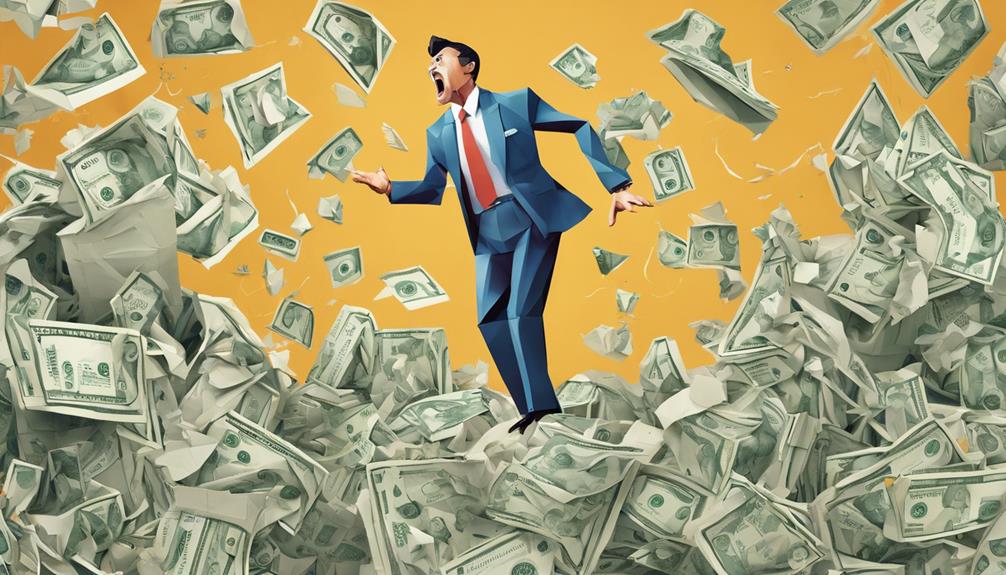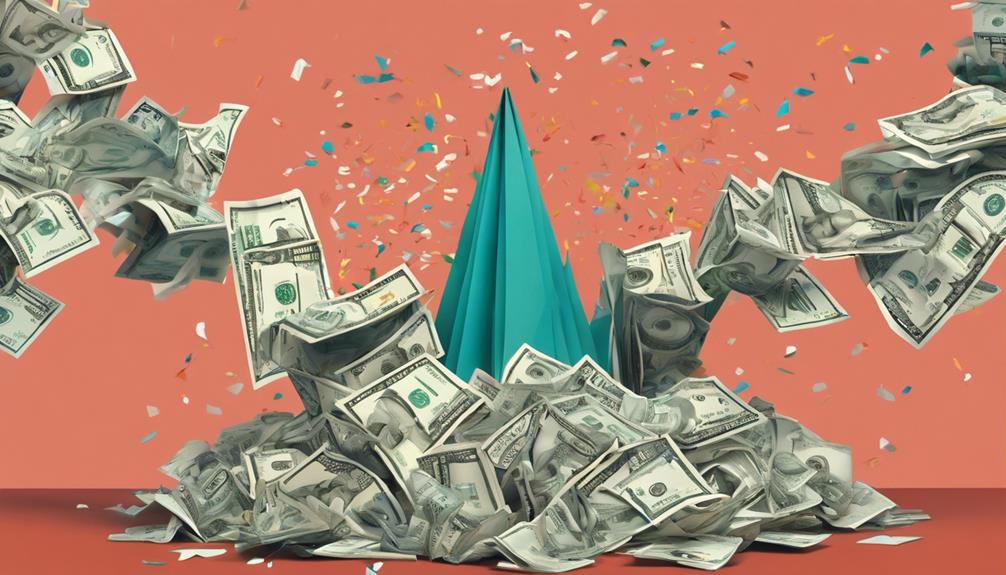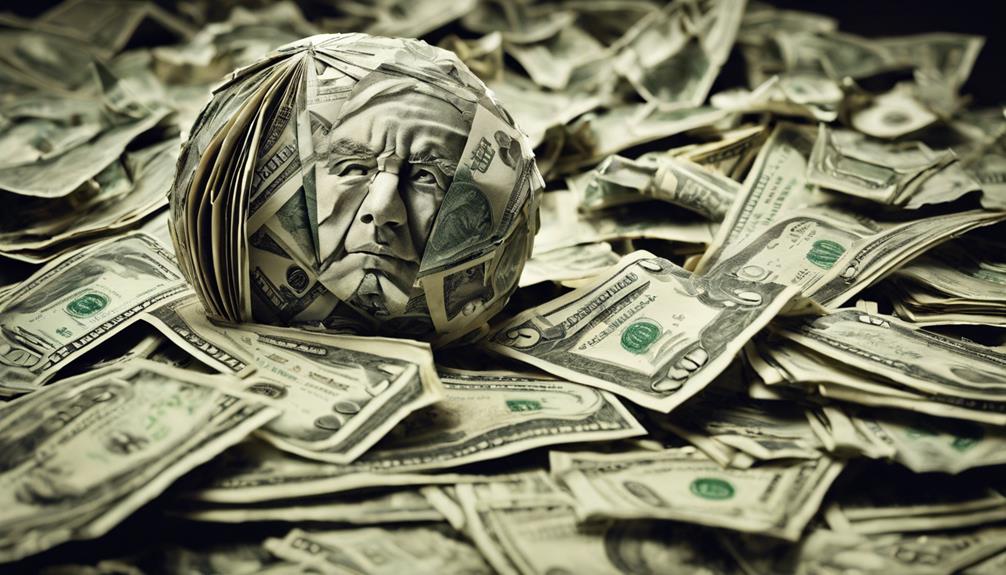In 2023, the speaking circuit has witnessed a surge in lucrative fees, with high-profile speakers like Michelle Obama and Tony Robbins commanding staggering sums, upwards of $1 million per engagement. Keynote speaker fees range from $20,000 to over $1 million, with experienced speakers averaging $16,659 for in-person events. Factors like experience, reputation, and audience size influence speaker fees, making it essential for event organizers to understand these variables to allocate their budgets effectively. As speaker fees continue to skyrocket, one thing is clear: the art of valuing expertise is pivotal in today's competitive speaking market, and there's more to uncover.
Key Takeaways
- Michelle Obama earned $741,000 for a one-hour speech in 2023, making her one of the highest-paid speakers.
- Tony Robbins is known to command over $1 million for engagements, showcasing the lucrative nature of high-demand speakers.
- Keynote speaker fees can range from $20,000 to over $1 million, depending on experience, reputation, and audience size.
- Experienced speakers can command higher rates, averaging $16,659 for in-person events in 2023, with some earning upwards of $400,000 per speech.
- The Obamas' net worth is estimated between $70 million and $135 million, highlighting the immense earning potential of in-demand speakers.
Top Speakers' Highest Earning Secrets
What's the secret to top speakers like the Obamas commanding such astronomical fees, and how do they maintain their lucrative speaking careers? One key factor is their ability to captivate audiences with their charisma and expertise.
Michelle Obama, for instance, earned a staggering $741,000 for a one-hour speech on diversity and inclusion in Germany in 2023. Her usual speaking fee is around $200,000, while her husband Barack Obama's fee is a whopping $400,000. These figures are a reflection of their immense popularity and the value they bring to the speaking circuit.
The Obamas' high speaking fees are a reflection of their global appeal and the demand for their insights. Their wealth has grown significantly through media ventures, with an estimated net worth between $70 million and $135 million.
Top speakers like the Obamas command substantial speaking fees, showcasing the lucrative nature of the public speaking industry. Their ability to convey valuable insights and inspire audiences has enabled them to maintain their lucrative speaking careers, with no signs of slowing down.
Calculating Speaker Fees Strategically

Calculating speaker fees strategically involves a delicate balance of factors, with experience, reputation, and audience size playing important roles in determining the final figure.
When negotiating speaker fees, talent agents play a vital role in guaranteeing fair compensation for their clients. Celebrity speakers, for instance, command higher fees due to their star power and public appeal, which greatly impacts their earning potential.
Conference speakers, on the other hand, offer specialized knowledge valuable to event attendees, influencing their fees accordingly. Keynote speakers, who set the tone and impact of an event, usually charge higher fees due to their pivotal role.
The Science Behind Keynote Rates

By examining the factors that drive keynote speaker fees, it becomes clear that the right combination of reputation, preparation, and impact can lead to lucrative payouts for these influential speakers. Keynote speakers aren't just entertainers, but rather thought leaders who can make or break an event. Their fees, which can range from $20,000 to over $1 million, reflect their value to the event's success.
To understand the science behind keynote rates, consider the following factors:
- Reputation: Established speakers with a strong track record of delivering impactful speeches can command higher fees.
- Preparation: Keynote speakers spend significant time crafting speeches that resonate with their audience, which justifies their compensation.
- Impact: Speakers who can inspire and influence attendees are in high demand, leading to higher fees.
- Talent agents: These agents play an important role in negotiating fair compensation for keynote speakers.
- Event importance: Keynote speakers are often the main attraction, making their fees a worthwhile investment for event organizers.
Unraveling the Fee Structure Mystery

The fee structure for keynote speakers is a complex puzzle, with variables such as experience, talk duration, and audience size influencing their rates. Understanding these factors is important for event planners to budget accurately and secure the right speaker for their event.
Fees vary greatly depending on the speaker's level of expertise, with top-tier speakers commanding higher rates due to their reputation and impact. According to The Public Speaker Agency, selecting the right keynote speaker is essential for event success, as their messages and persuasive power are crucial.
Consequently, motivational speaker fees can be substantial, making it necessary for event planners to comprehend the fee structure. By recognizing the variables that influence speaker fees, planners can make informed decisions and allocate their budgets effectively.
Ultimately, grasping the intricacies of the fee structure enables planners to secure the perfect speaker for their event, ensuring a memorable and impactful experience for attendees.
The Art of Valuing Expertise

As event planners navigate the complex landscape of keynote speaker fees, they must recognize that the art of valuing expertise is a delicate balance of experience, reputation, and audience size. This intricate dance determines the worth of a speaker's time and expertise.
Speakers who command higher fees often possess a unique combination of qualities, including:
- Experience in their field, which lends credibility to their message
- A strong reputation, built on past successes and audience acclaim
- The ability to captivate large audiences, making them a valuable asset to event organizers
- A proven track record of delivering high-quality content and results
- A unique perspective or proprietary methodology that sets them apart from others in their field.
How Much Do Motivational Speakers Charge?

When it comes to motivational speakers, their fees can vary greatly, ranging from a few thousand dollars to millions of dollars per engagement.
Understanding these rates requires exploring the average fee structures, speaker rate ranges, and the secrets behind the top earners' success.
Speaker Rate Ranges
Motivational speakers command varying fees, with regular professionals in the US typically charging between $1,000 to $10,000 per speech. These rates can vary greatly depending on the speaker's expertise, reputation, and the type of event.
Here are some examples of speaker rate ranges:
- Celebrity speakers can demand fees ranging from tens of thousands to over a million dollars for a speaking engagement.
- Motivational speakers like Tony Robbins are known to command over $1 million for coaching or speaking engagements.
- Conference and corporate event speakers may charge anywhere from $5,000 to $50,000 per talk, depending on their expertise and reputation.
- Keynote speakers, who set the tone for events, can charge upwards of $20,000 or more for their impactful presentations.
- Regular professional speakers in the US typically charge between $1,000 to $10,000 per speech.
These rates demonstrate the wide range of fees that speakers charge, and highlight the importance of understanding the value they bring to events.
Average Fee Structures
On average, professional motivational speakers in the US charge between $1,000 to $10,000 per speech, with top-tier speakers commanding significantly higher fees. When it comes to speaking, motivational speakers are often categorized based on their level of expertise and demand.
Conference and corporate event speakers typically charge between $5,000 to $50,000 per talk, while keynote speakers, who set the tone for events, can charge upwards of $20,000 for their impactful speeches.
Celebrity speakers, on the other hand, can demand fees ranging from tens of thousands to over a million dollars for their speeches. Notable motivational speakers like Tony Robbins can command over $1 million for coaching sessions and speeches. These figures highlight the significant earning potential of successful motivational speakers, who've honed their speaking skills to inspire and motivate their audiences.
Top Earner Secrets
Essential
Beyond the average fees, top-tier motivational speakers, like Tony Robbins, command astronomical figures, leveraging their celebrity status and unparalleled expertise to rake in seven-figure sums for coaching sessions and speeches. These motivational speakers have mastered the art of inspiring and motivating audiences, making them highly sought after.
Here are some key facts about motivational speaker fees:
- Top motivational speakers can command over $1 million for coaching sessions
- Motivational speaker fees vary based on popularity and personal experiences shared during presentations
- Regular professional speakers in the US typically charge between $1,000 to $10,000 per speech
- Speaking honorariums are voluntary payments sometimes made to motivational speakers for their services
- Understanding motivational speaker fees is essential for event planners seeking impactful presentations
Speaker Fees by Industry Standards

Across industries, speaker fees vary widely, with experienced speakers commanding higher rates, averaging $16,659 for in-person events in 2023. This discrepancy highlights the importance of understanding industry standards in public speaking.
The average in-person speaker fee in 2023 is $15,551, with seasoned speakers charging around $16,659 on average. Importantly, 80% of virtual event speakers charge less than $10,000 for their services. This disparity suggests that in-person events are willing to pay a premium for top talent.
Additionally, 53% of speakers are increasing their fees in 2023, indicating a growing demand for high-quality public speaking. Event organizers should take note, as the average event budget allocated for a keynote speaker is $26,582.88.
Of note, most speakers expect event organizers to cover travel costs, with only 12% including travel expenses in their speaking fee. As the public speaking industry continues to evolve, understanding these industry standards is essential for both speakers and event organizers.
The Rise of Personalized Presentation Pricing

As the trend towards personalized presentation pricing continues to gain momentum, speakers are now tailoring their fees to reflect their unique profiles. They are implementing tiered pricing systems and placing a premium on customized content value. This shift towards bespoke presentations acknowledges that each event has distinct requirements. Speakers are adapting their pricing strategies accordingly. By doing so, they guarantee that their compensation accurately reflects the effort and value they bring to each engagement.
Unique Speaker Profiles
With the rise of personalized presentation pricing, speakers are now able to tailor their fees to the unique needs of each event, taking into account factors such as experience, audience size, and talk duration. This shift has led to the emergence of unique speaker profiles, where experts can differentiate themselves based on their expertise, tone, and style.
Some speakers are capitalizing on their niche expertise, commanding higher fees for topics like mental health, which are in high demand. Others are highlighting their ability to engage and inspire audiences, offering customized presentations that cater to specific event goals.
- Speakers with extensive experience in high-stakes industries, such as finance or healthcare, can command premium fees.
- Those who offer unique storytelling styles, incorporating humor or emotional connections, can differentiate themselves from others.
- Experts in high-demand fields, such as technology or sustainability, can charge higher fees due to their specialized knowledge.
- Speakers who can adapt to diverse event formats, from keynotes to workshops, can increase their earning potential.
- Those who can provide actionable takeaways, offering tangible value to attendees, can justify higher speaking fees.
Tiered Pricing System
Speakers are now adopting a tiered pricing system, which enables them to tailor their fees to the unique requirements of each speaking engagement. This system allows them to offer personalized presentation pricing based on factors like audience size, event type, and customization.
Within the tiered pricing structure, speakers can charge different fees for keynote speeches, workshops, panel discussions, and virtual events. This flexibility enables them to adjust their rates accordingly for different types of events, reflecting the diverse nature of speaking opportunities.
By implementing a tiered pricing system, speakers can offer more flexibility in their fee structures, making their services more accessible and appealing to a wider range of clients. This approach benefits both speakers and clients, as it maximizes value for both parties.
A Speakers Bureau can also play an important role in facilitating this process, connecting clients with speakers who offer tailored pricing solutions. As the speaking industry continues to evolve, the tiered pricing system is becoming an essential tool for speakers looking to stay competitive and deliver high-value presentations.
Customized Content Value
Customized content value is revolutionizing the speaking industry, as personalized presentations tailored to specific audiences and events command premium fees. This shift towards bespoke content has led to a significant increase in speaking fees, as speakers invest substantial time and effort into crafting unique presentations that resonate with their audience.
Some key aspects of customized content value include:
- Extensive research on attendees to provide personalized content, enhancing the relevance and engagement of the speech
- Fair fees charged to sustain quality work and well-being, reflecting the effort and customization put into each presentation
- Engagement with attendees off-stage to provide value and advice
- Post-event solitude to recharge, essential for maintaining the quality of future presentations
- Speakers spending significant time preparing and customizing speeches for each conference or workshop, contributing to the value of their presentations
What Drives Speaker Fees Upwards

Popularity, demand, and expertise in a specific topic significantly contribute to the upward trajectory of a speaker's fees. When a speaker is in high demand, organizations are willing to pay a premium to secure their services. Renowned speakers like Michelle Obama, who can command speaking fees as high as $741,000 for a single hour-long speech, are a confirmation of this phenomenon.
The perceived value, impact, and unique insights that a speaker can provide play an important role in determining their speaking fees. For instance, conference attendees often expect high-profile speakers to deliver tailored content that addresses their specific needs and concerns. As a result, speakers who can deliver customized content that resonates with their audience can command higher fees.
Additionally, celebrities and high-profile individuals often demand higher speaking fees due to their star power and influence. The willingness of organizations to pay top dollar for top-tier speakers contributes to the overall increase in speaker fees.
The Future of Speaker Compensation

As the demand for top-tier speakers continues to drive up fees, the industry is shifting its focus to the future of speaker compensation, where adaptability and creativity will be key to staying ahead of the curve. With speaker fees on the rise, event organizers and speakers alike must adapt to the changing landscape.
To stay ahead, consider the following trends shaping the future of speaker compensation:
- 53% of speakers are increasing their fees in 2023, indicating a growing demand for their services.
- The average in-person speaker fee is $15,551, with experienced speakers charging around $16,659 on average.
- 80% of virtual event speakers charge less than $10,000, showing a trend towards more affordable virtual engagements.
- Speaker fees are a significant part of event budgets, with the average event budget for a keynote speaker totaling $26,582.88.
- Only 12% of speakers include travel costs in their speaking fee, highlighting the importance of budget considerations.
As the industry evolves, speakers and event organizers must be prepared to navigate these trends and find innovative solutions to stay competitive in the market.
Frequently Asked Questions
What Is the Highest Paid Speaker Fee?
She wonders what the highest paid speaker fee is, considering influential figures like Michelle Obama, who earned $741,000 for a single speech, and her husband Barack, who commands $400,000 per engagement.
Who Is the Highest Paid Motivational Speaker?
She notes that the highest paid motivational speaker is Tony Robbins, who can command over $1 million for coaching sessions, reflecting his popularity, impact, and life experiences that inspire and motivate audiences worldwide.
How Much Does Oprah Charge to Speak?
Oprah Winfrey's wallet smiles when she takes the stage, commanding fees between $100,000 to $300,000 per event, thanks to her influential status, drawing massive crowds, and serving up inspiring messages that leave a lasting impact.
How Much Does Richard Branson Charge to Speak?
Richard Branson charges a hefty fee to speak, ranging from $100,000 to $250,000 per engagement, due to his compelling entrepreneurial insights and reputation as a successful entrepreneur and philanthropist.
What Makes the Speaking Fees of Brene Brown and Other High Profile Speakers So High?
It’s no surprise that the shocking brene brown speaking fee and those of other high profile speakers are so high. These speakers bring a wealth of experience, expertise, and insight to their audiences. Their ability to connect, inspire, and educate makes them in-demand and justifies their premium rates.
What Impact Will the NYC Rental Market Have on Speaking Fees in 2023?
The nyc rental market forecast for 2023 suggests that speaking fees may see a noticeable impact. As rental prices continue to rise, speakers may adjust their fees to offset the heightened cost of living and working in the city. This forecast could lead to changes in the speaking industry.
Conclusion
To sum up, the highest speaking fees of 2023 are a reflection of the value placed on expert knowledge and engaging presentation skills. Importantly, the average speaker fee has increased by 27% since 2020, with top-tier speakers commanding upwards of $100,000 per engagement.
As the industry continues to evolve, one thing is clear: the art of public speaking is a lucrative business that shows no signs of slowing down.










